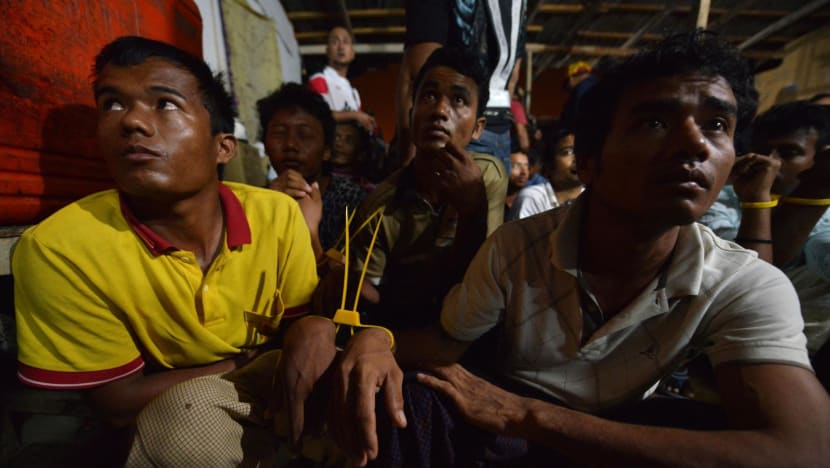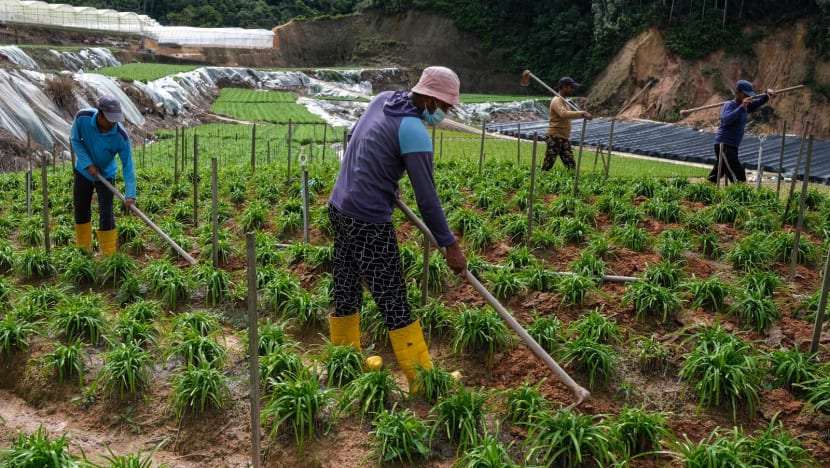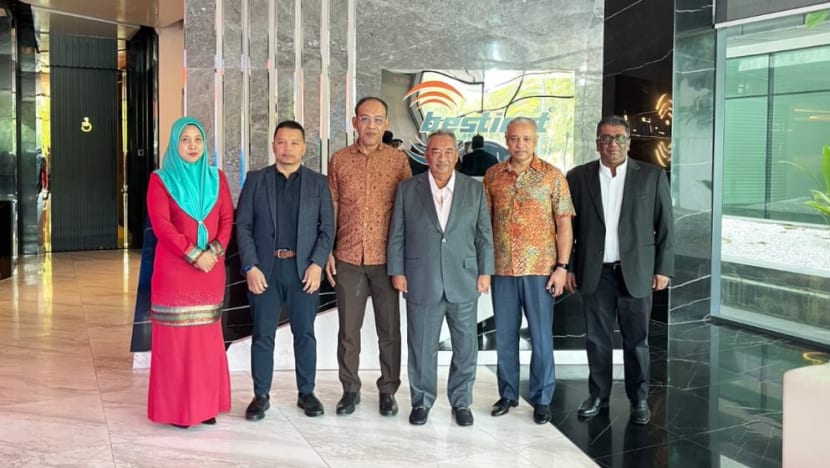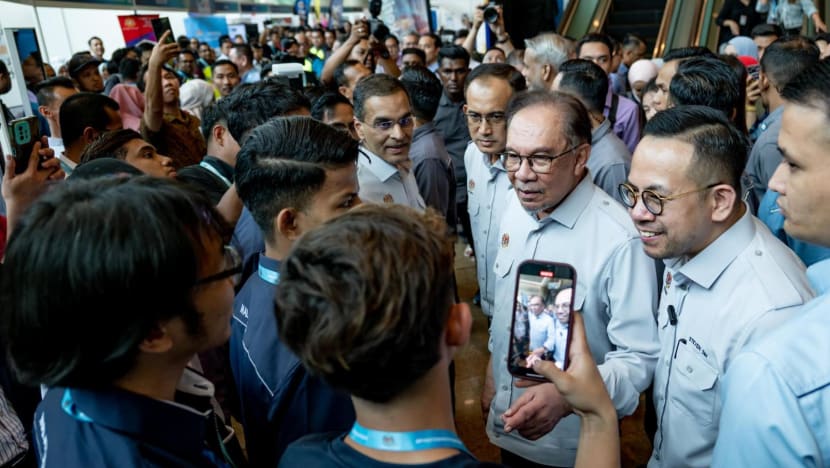Malaysia’s bid to revamp hiring of foreign workers faces pushback; activists say country’s reputation at stake
The Anwar government is looking to change a key platform for managing migrant workers. But it’s facing stiff resistance from the company behind the IT system, sources tell CNA.


This audio is generated by an AI tool.
KUALA LUMPUR: An ambitious plan by the Anwar Ibrahim government to overhaul the country’s migrant worker recruitment policies, particularly the problem-ridden employment of Bangladesh nationals, is coming under stiff resistance from industry players and segments of civil servants determined to maintain the status quo.
Pushback against the government’s migrant labour reform is coming from privately controlled Bestinet Sdn Bhd, a firm which has strong links to Malaysia’s top politicians and has long been a magnet for controversy, government sources told CNA.
The contention is over plans by the Home Ministry to replace Bestinet’s proprietary IT system that currently manages the movement of foreign labour into Malaysia, which a previous government review had concluded as riddled with abuse and mismanagement.
Bestinet’s contract with the government to operate its so-called Foreign Workers Centralised Management System (FWCMS), which is the sole platform used by the country’s Immigration Department for visa applications from 15 different countries exporting labour to Malaysia, is set to expire at the end of this month, according to government sources and documents reviewed by CNA.
The company’s top management, including founder Mohamed Amin Abdul Nor, and labour agents aligned with Bestinet have been actively lobbying the Anwar government, say sources. This includes tapping their connections with Malaysia’s political elite to secure a fresh multi-year extension for the FWCMS concession.
Bestinet is determined to head off a government plan to introduce a new mechanism, administration officials and labour activists close to the situation say.
The new system features an IT portal that has been under development for the past year and seeks to make the process of foreign labour recruitment cheaper, more transparent and minimise third-party involvement.
Home Minister Saifuddin Nasution Ismail did not respond to requests for comment, but a senior advisor to his ministry said the matter will be discussed at the weekly Cabinet meeting before Prime Minister Anwar makes a final decision.
Bestinet executives declined comment for this article.
HIGH STAKES FOR BESTINET AND ANWAR
Securing an extension to its FWCMS platform is critical to Bestinet, which is a pivotal player in the multi-billion-ringgit foreign labour recruitment sector.
The company declared a net profit of RM85.04 million (US$18 million) in end-2022, a whopping jump from a paltry RM704,432 the year earlier, according to financial information lodged at the Companies Commission of Malaysia.
The stakes are equally high for the Anwar administration.
Malaysia, an export-dependent economy and one of the world’s top 30 trading nations, has been recruiting workers since the early 1990s and migrant labour makes up about 30 per cent of Malaysia’s workforce that is estimated at 14.5 million employees.
But combined with the number of undocumented workers, their numbers could be as high as 38 per cent, or around 5.5 million based on unofficial estimates.

The migrant labour recruitment industry has long attracted domestic and international opprobrium due to collusion among politicians, enforcement agencies, recruitment companies, labour brokers and exploitative employers.
This has resulted in Malaysia being listed with the likes of China and North Korea for its poor progress in eliminating human trafficking by the United States State Department.
Since December last year, Malaysia also has seen a wave of Bangladeshi workers being lured over by fake job opportunities. Rights groups estimate their numbers could be in the tens of thousands.
Last month, a group of experts from the United Nations chastised the Malaysian government over the plight of the Bangladeshi workers.
The experts expressed concern that large sums of money were being generated through the fraudulent recruitment of migrant workers by criminal networks operating between Malaysia and Bangladesh.
Migrants were being deceived, recruited by companies that are frequently fake, and obliged to pay exorbitant recruitment fees which pushes them into debt bondage, the experts said.
“The situation of Bangladeshi migrants who have lived in Malaysia for several months or longer is unsustainable and undignified,” the experts said. “Malaysia needs to take urgent measures to address the dire humanitarian situation of migrants and protect them from exploitation, criminalisation and other human rights abuses.”
Responding days later, Bestinet defended its FWCMS system. Such cases involving Bangladeshi workers “could be avoided with proper due diligence through the FWCMS system”, chief executive officer Ismail Mohd Noor told the New Straits Times.
By digitising and centralising steps in the hiring and management of migrant workers, the system provides visibility and traceability, mitigating the risk of exploitation and abuse, he claimed.

RAIDED IN 2023
Bestinet is no stranger to controversy.
In 2018, it was embroiled in allegations its affiliates had benefited to a tune of RM185 million between 2013 and 2018 from Nepali workers seeking to work in Malaysia. The Malaysian government suspended Bestinet’s operations, but cleared it of wrongdoing the following year.
In May 2023, the Malaysian Anti-Corruption Commission (MACC) arrested several government officials at the Human Resource Ministry in connection with a corruption investigation involving the recruitment of migrant workers from Bangladesh. Weeks later, it raided Bestinet and questioned a number of its executives, including its controlling shareholder Mr Mohamed Amin.
So far, nothing has emerged from the MACC probe, but the Anwar administration has transferred the governance of the migrant worker procurement ecosystem from the Human Resource Ministry to the direct purview of the powerful Home Affairs Minister Saifuddin.
Mr Mohamed Amin, a former Bangladesh national who has taken up Malaysian citizenship, is said to enjoy close ties with top civil servants and politicians including Deputy Prime Minister Ahmad Zahid Hamidi. It was during Mr Ahmad Zahid’s tenure as Home Minister under the previous Najib administration that Bestinet secured the concession to operate its FWCMS platform.
But the company’s relations with the Home Ministry under Mr Saifuddin has been less-than-cosy.
Mr Saifuddin has made no secret of his displeasure with the current migrant labour recruitment system. During an official visit to Bangladesh in February last year, Mr Saifuddin met with members of the Bangladeshi Association of International Recruiting Agencies (BAIRA) in Dhaka. He acknowledged he was unhappy with the recruitment systems in place and that elements of graft needed to be wiped out.
BAIRA has more than 1,500 members operating in the country but only 100 agencies with close ties to Bestinet and accredited by the Malaysian government have a stranglehold on the recruitment of workers to Malaysia.
BAIRA’s chairman Mohammed Abul Basher told CNA that the government is handling negotiations with Malaysia directly over the plan to revamp the current recruitment process. He declined to elaborate.
UNSCRUPULOUS AGENTS, BROKERS
Malaysia’s foreign labour recruitment system had long been a hotbed of unscrupulous agents and labour brokers working with counterparts in countries providing the manpower.
In a bid to bring more order to the labour recruitment sector, the government of now-jailed former premier Najib Razak awarded Bestinet a contract in 2013 to assist the Home Affairs and Human Resource ministries in the recruitment of foreign labour for Malaysian companies.
Under the so-called FWCMS, companies in various sectors of the economy would submit applications on their labour needs and Bestinet would help in the sourcing from 15 countries such as Indonesia, Bangladesh, Nepal, the Philippines, Myanmar, India and Vietnam.
But the FWCMS platform did not stem mismanagement, resulting in foreign labour applicants being exploited by a convoluted set of players in both the host and exporting countries.
The problems are particularly acute with the labour from Bangladesh, noted labour activists.
It is estimated that there are around 400,000 Bangladeshis who are employed in various economic sectors in Malaysia. But labour activists noted that the figure could be four times higher if illegal workers are accounted for.
Typically, a single Bangladeshi recruit pays roughly RM20,000 to a cast of players and the hefty fee involved is often settled through loans provided by other agents.
These loans often lock workers into years of a debt bondage that can only be paid by working long hours and accepting dismal work and living conditions.
Despite the controversy surrounding Bestinet, the company received an extension in January 2018 to operate the FWCMS platform for another six years from the then-Najib government.
That award, however, came under a cloud following the change of government after the May 2018 general election.
A new government-appointed task force that was set up after the 2018 national polls to review foreign worker management protocols concluded that the entire recruitment system for Bangladeshis was riddled with mismanagement and corruption. It also recommended that the platform operated by Bestinet be overhauled.
But the subsequent political strife in Malaysia, which saw the change of three administrations until Mr Anwar took power in November 2022, allowed Bestinet to operate uninterrupted.
Government officials involved in the labour reform plans noted that Home Minister Saifuddin is leaning towards a new system designed to limit third-party involvement to its minimum and match the labour needs of the country’s economic sectors, such as the construction, plantation, and maintenance services, with supply from countries eager to export their workforce.
Proponents of the supply-demand platform noted that levies for applicants from Bangladesh could fall below RM10,000 per person.

PRECARIOUS SITUATION?
Mr Charles Santiago, a former elected Member of Parliament who is part of a government-private sector working committee involved in bringing change to the country’s migrant labour recruitment system, told CNA that Malaysia is in a very precarious situation and the government needs to urgently reform the sector and end Bestinet’s stranglehold.
“The statements coming out from UN agencies are clear signs that the country has crossed the line over the issue of forced labour with migrant workers,” he added.
Agreeing, Mr Andy Hall, a Nepal-based labour activist who has done extensive work on the migrant labour situation in Malaysia, said: “The system is broken and the situation in Malaysia is no longer (just) a human rights issue involving forced labour that borders on slavery.”
Mr Santiago is pushing for the Malaysian government to stop accepting workers from the South Asian nation until shortcomings in the recruitment process can be properly addressed.
“Not only is the system here in the recruitment of Bangladeshi workers a problem, the system at the other end is also very rotten because there are so many layers of agents and brokers that simply exploit recruits,” he said.
There could be more bad news for Malaysia in the coming weeks, with the US State Department set to issue its annual Trafficking in Persons (TIP) Report.
Mr Hall noted that Malaysia’s failure to combat the serious shortcomings in the migrant labour recruitment process, despite repeated red flags raised by UN experts and international agencies, could lead to the country being downgraded to Tier 3 on the watch list, which exposes the economy to the risk of sanctions, from Tier 2 currently.
The TIP Report is a closely tracked assessment that evaluates global trafficking trends and focuses on government efforts in prosecution, protection and prevention.
Malaysia was downgraded to Tier 3 in 2021 and 2022, a status that led to five companies being slapped with export bans to the US.
The companies included glove manufacturer Top Glove and Supermax, together with plantation giants Sime Darby and FGV Holdings Bhd. The bans have since been lifted.

















